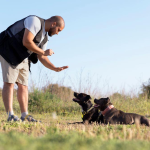For a lot of pet owners, what usually comes to mind is the right way to physically take care of them, right? Most likely, you are just thinking of when you can take your dog out to play, what is the best brand of dog food to feed them, and whether or not they have fleas.
As you can see, those are just really basic things, right? But that is not the only thing you should think about. While yes, all animals, especially dogs, seem to be naturally happy and in high spirits, you have to keep in mind that they, too, have mental health.
Dogs, like humans, experience stress, and as pet owners, it is our responsibility to recognize and address it. Stress in dogs can manifest in various ways, some obvious and some quite subtle. It is not like they can actually speak about it like humans can.
So, being able to identify these signs can help ensure your furry friend remains happy and healthy. For example, do you know how to calm a panting dog in the middle of the night? Now, with all of that said, let us dive into the common indicators that your dog might be under a lot of stress.
Changes In Behavior And Mood
One of the most noticeable signs that your dog is stressed is a change in their behavior and mood. If your typically happy-go-lucky pup suddenly becomes withdrawn, it is a signal that something might be off. It is not a part of their personality, you know that!
But it is not just that, though; they might become unusually aggressive, irritable, or overly clingy. On the flip side, a normally affectionate dog might start avoiding contact and prefer to be alone. While some animals are like this, it is not too common for dogs unless something traumatic happens to them. So, you need to keep an eye out for any drastic shifts in their usual demeanor, as these changes are often the first clue that your dog is experiencing stress.
Excessive Barking Or Whining
Dogs just bark; that is common, and as you already know, dogs communicate through sounds. However, an increase in barking or whining can be a sign of stress. In a way, they’re letting you know how they see. So, if your dog is vocalizing more than usual, especially in situations that did not previously bother them, it is worth paying attention to. For example, if they are whining when you leave the house, it might be more than just a habit—they could be trying to tell you they are feeling uneasy.
Changes In Eating And Sleeping Patterns
So you definitely need to pay close attention to this one, as this is a major giveaway! So, stress can significantly affect your dog’s eating and sleeping habits. You might notice your dog losing interest in their food, eating much less than usual, or in some cases, overeating as a comfort mechanism.
Are they up a lot? Why is my dog sleeping so much? Basically, is everything just not normal for them? You have to keep in mind that dogs prefer routine, and they have a biological clock, so if they are not going by that clock, something is happening.
Physical Symptoms
Just like humans, dogs can exhibit physical symptoms when they are stressed. You know how humans will lose hair when they are stressed? Well, they do that too. But they also pants. While yes, happy dogs also pant, you can just sort of get a vibe that something is off. They will usually pant heavier than usual. Do they shake? Are they cowering? Are they avoiding eye contact? All of these are also signs.







